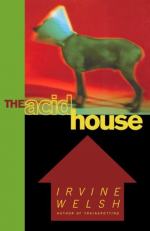|
This section contains 730 words (approx. 3 pages at 300 words per page) |

|
SOURCE: “The Lads of Leith,” in Times Literary Supplement, No. 4,746, March 18, 1994, p. 12.
In the following review of The Acid House, Welsh's follow-up to Trainspotting, Clee notes that the second book cannot match the intensity of the first. Still, he finds Welsh's talents for hard-eyed sympathy and flexible language undiminished.
Irvine Welsh's novel, Trainspotting published last summer, was one of the most arresting debuts for many years. A grim tour through the world of booze-addled, drug-addicted, HIV-infected Edinburgh youth, the novel was shocking, ugly and violent; it was also desperately funny, pitilessly compassionate. Welsh is a political writer: how, given his subject-matter, could he not be? Yet his narrative breathed uninhibitedly, unstifled by any point-making. There was no redemption for the characters in Trainspotting no validation of their lives through art. There was, though, sympathy, of the kind a writer can create with a truthful, unsparing imagination. The book...
|
This section contains 730 words (approx. 3 pages at 300 words per page) |

|


